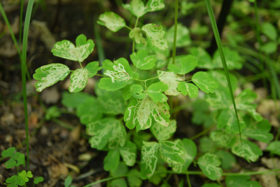
By midsummer, the forest wildflowers are done for the season in the woods at Crossroads at Big Creek, but the foliage still is interesting. If you look closely at the leaves, you may notice funny squiggly tunnels in many of them.
The tunnels are the evidence of insects called leaf miners. “Leaf miner” is not a species, but rather is a general term which includes some types of caterpillars, some beetle grubs, and the larvae of several species of fly.
These immature insects live and feed inside leaves. Understand that leaves are thin but these little insects are really flat. They have no legs. The don’t need eyes or antennae. But they do have a special adaptation: their heads are wedge-shaped so they can separate the top from the bottom of a leaf enough to squeeze through.
The insects eat their way through the soft juicy leaf tissue. It’s fun to look closely at a tunnel. Near where the egg was laid, the tunnel—the “mine” –is very skinny. As the larva grows bigger and bigger, the tunnel gets progressively wider.
Leaf miners rarely eat in a straight line…..random squiggles are far more common, but it is hard to generalize because so many different kinds of insects mine leaves. That said, most adult leaf miners have wings and to become adults, the immature insects must pupate.
Science books call this the “resting stage” but the pupal stage is more than that. This is the time of life when the cells of the insects get reorganized. Some species leave their mines before they pupate, some stay right inside the leaves, some bite off pieces of leaf and spin a cocoon with silk, and a few [this is gross] make their cocoons with their own droppings.
But eventually, as adults, miners fly, mate, and the female lay eggs on the exact plants their offspring will need to thrive. Gardeners, orchardists, and foresters tend to dislike miners because they can cause leaves to wilt. Sprays don’t touch them—the larvae live literally inside leaves. But miners are part of the forest ecosystem….and important food for our tree frogs (such as spring peepers!) and birds.
Our forests our filled with interesting creatures. Crossroads visitors are welcome to explore all three of our preserves. But we recommend participating in our family programs, offered Monday through Thursday at 10:00. The programs are free and open to learners of all ages.
Crossroads at Big Creek is a preserve welcoming learners of all ages to activities in science, history and the environment. The Collins Learning Center, located at 2041 Michigan just off the roundabout in Sturgeon Bay, is open noon to 3:00 daily and during scheduled events. The trails at Crossroads, Big Creek Cove and the Ida Bay Preserve are free and open to the public.
Wednesday, July 13
10:00 Family Program: Explore the Heritage Garden
Search the garden for butterflies, bees, beetles, and other insects that help flowers develop into fruits and vegetables. Learn what plants were grown in a 1900’s village garden and discover their use for medicine as well as food. Free and open to the public. Meet at the Collins Learning Center.
Thursday, July 14,
10:00 Family Program: Fossils! Leave No Stone Unturned
It is hard to imagine that the land we now call Wisconsin was once covered by warm salt water – until you find the fossil of a prehistoric sea creature. Join the summer educator to learn about the creatures that once lived here millions of years ago. Meet at the Collins Learning Center. Free and open to the public.
Monday, July 18
10:00 Family Program: Butterflies Everywhere!
Get up close and observe the delicate beauty of these flying creatures in a catch and release hike (nets provided.) Meet at the Collins Learning Center. Free and open to the public.
Tuesday, July 19
Family Program: Mammals Like Us
Choose a Door County animal from the wildlife exhibit in the Collins Learning Center, then join the summer educator to learn about its special life. Does it hibernate? Migrate? What does it eat? Where does it live? What are some of its adaptations? Join us to find out. Meet at the Collins Learning Center. Free and open to the public.
Wednesday, July 20
10:00 Family Program: Insect Safari
Hike into the fields and forests with collecting nets to find the insects and their hiding places. They leave behind clues on leaves, under the bark of trees, in galls, and cocoons and chrysalides. Meet at the Collins Learning Center. Free and open to the public. Nets provided.

